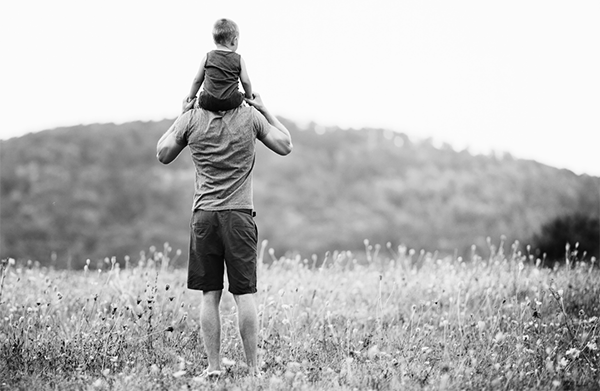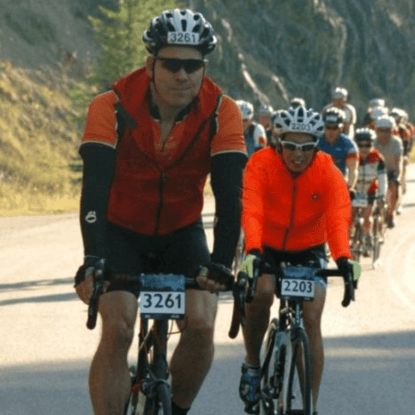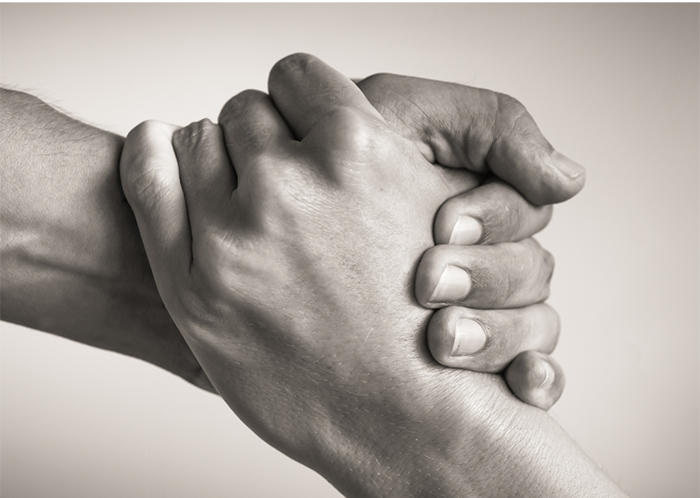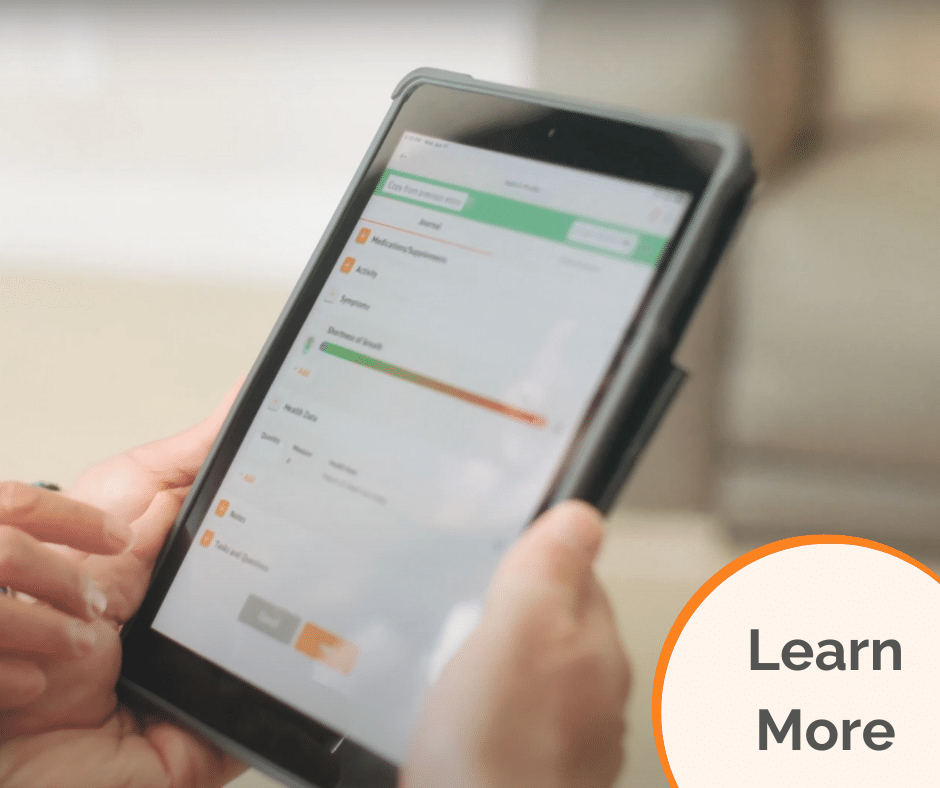A Caregiver’s Journey: Learning, Listening, and Accepting
I distinctly remember the day I finally figured out what it means to me to be a caregiver. My oldest son had been diagnosed with severe Obsessive Compulsive Disorder (OCD), was starting out on medication and was in the early days of therapy. His obsession was related to cleanliness, and the biggest challenge he faced was using the washroom.
One of the cruelest things about OCD is how it makes you doubt things, and in his case, it was whether or not he was ‘clean’ enough to leave the washroom. The answer was almost always no, and an average trip to the washroom in those early days would take 3-5 hours. It is also a very painful thing to observe as a parent.
The second hardest day of my life was working in the study at home, and hearing my son crying in the washroom on the other side of the wall because he couldn’t get out. But in the end, we figured out a washroom hack that worked.
Once he was finished and had washed his hands until they were clean (another story in itself), he would jump in the shower and I would come in and disinfect his entire washroom. I would then walk out backwards, cleaning the floor as I went, and he would jump out of the shower, walk into his room and air dry for half an hour before we would both go to bed.
The challenge was that this would normally take place sometime between midnight and three in the morning. And one of these nights, because he is a very thoughtful young man and knew I was exhausted, he told me to go to bed and that he would figure out how to manage.
And it was at that moment around 1:30 a.m. outside the washroom door that I realized there was nothing more important to me and nowhere more important to be, than being there for my son. And that was when I finally figured out what it means to me to be a family caregiver.
Now taking a step back, it might be helpful to share more about myself so that you can put that story into context. I’m a middle-aged white male who tends to use logic over emotion (my late wife Lorraine was prone to saying it was like being married to Spock), I should at times listen more, rather than trying to immediately ‘solve’ problems, and while I’m really smart in some ways (usually involving spreadsheets), I can struggle with other, more obvious common sense things.
Over the past eight years I’ve been a caregiver four separate times: twice for Lorraine before she passed away from NUT carcinoma in 2014, once for each of my children, and this is not counting my own ongoing issues.
The story I shared above occurred during my fourth time as a caregiver, which some good friends might say shows how slow I am to figure things out. But I think it also shows how it’s not unusual to cling to our expectations in life, even when those ships have long since sailed.
And it is from this perspective that I’ve learned a few things that I hope may help other caregivers and patients as they walk similar paths. And literally on a path is where this story really begins.
In 2012, if you had talked to Lorraine and I about what our lives would be like in 2020, we would have gotten everything wrong. Our oldest son would be moving out after graduating from high school, our youngest would have been a year away from being finished, and we would have been a planning the next stage of our lives, with lots of travel, cycling around the world, and growing old together.

Then in March of 2012 Lorraine had a pain in her right leg after a hike, which turned out to be something called a giant cell tumor in her femur. A titanium plate, six screws, some wire, and a bucket of bone cement later, she could barely get around with a walker. This was my first real experience as a caregiver.
I was working full time, taking care of Lorraine and the boys, and all during a time before Skip the Dishes. And the thing I remember the most was being tired. But I didn’t have to go through a seven-hour emergency orthopedic surgery, so I sucked it up. And two years later, after lots of physio and something called a forced manipulation (which is as bad as it sounds), Lorraine had ridden three Gran Fondos and you could barely notice her limp.
My takeaway from this time in my life was if you worked hard, you could get by without too many life changes, except waking up the odd time to one of your kids covering you up with their blanket when you fell asleep on the floor, or the couch, or in their beds. Unfortunately, that didn’t work the second time around.
After getting a mysterious bump on her head biopsied in August 2013, Lorraine was ultimately diagnosed with NUT carcinoma, a rare and very aggressive form of cancer with an average life expectancy of six months.
Which leads me to my first key learning, Redefining Hope.
This concept came from Bert Enns, a wonderful counsellor at the Tom Baker Cancer Center in Calgary who worked with Lorraine and I. Because we knew Lorraine was going to die, hope was redefined from growing old together to Lorraine having the best quality of life she could with family and friends before that happened.
So, we travelled with the boys between chemotherapy, radiation therapy and surgery, and made as many good memories as we could. It was later I learned as part of my meditation practice that Redefining Hope isn’t a new concept, it was just new to us. Impermanence and change are constant in life. Many people know nothing else, and in hindsight Lorraine and I had been lucky to have gone as long as we had before something ruined our plans.
My second key learning during this time was to Take Care of Yourself, and Accept Help.
And I was surprised by the forms help came in. A food schedule was created by Lorraine’s friend Donna, and three nights per week dinner was brought to us by different friends. My business partner Tom created a site where Lorraine could blog, which was cathartic for her, and saved on answering a lot of well-meaning but draining “How are you?” e-mails.
My other business partner Barb created guided meditations for Lorraine, which made bedtime a bit weird when I would drift off to Barb’s voice telling me to close my eyes. My buddies Evan and Glen were on call to go for ‘no cancer talk’ beers, so I could find an hour or two of respite occasionally.
And an awesome client (because of course I was still working) fired me because I was exhausted and they could see what I couldn’t, that I should be spending more time with my family (thanks again Doug and Jarvis).
It is also important to note that we got professional support for the boys, and in addition to the support from the cancer center, I started working with a private psychologist. And while the latter might not be financially feasible for everyone, there are supports of different types pretty much everywhere, and now online, so it is important to find what works for you. Because if you are drowning, you won’t be able to keep anyone else afloat.
Before she passed away, Lorraine shared with me that she was dying with no fear and no regrets, having lived her life to the fullest for the time she had. This became the theme for her celebration of life, and a couple of years later I had it tattooed on my wrists in her handwriting so that this inspiration would always be with me. And I still live with gratitude to all the people who helped make our last months together possible.

My third key learning was to Try to Be a Good Listener.
I can hear women everywhere laughing in disbelief at this, and laughing and laughing and laughing - please stop laughing. A really hard thing I’ve found about being a caregiver is the feeling of helplessness. Not everything can be fixed, and trying to fix things isn’t always what’s needed. It turns out sometimes the best thing you can do is shut up, give someone a hug, and listen.
I joke with my current partner Tonia (yes, dating after your wife dies will be a future blog post or 20) that she got a much better version of me because of this, and the fact that all of my therapy has made me much better at expressing my emotions and I have developed good listening skills.
Not good at expressing my emotions, but much better. Another important thing to remember about being a caregiver is that it in the end, it’s not about you. It’s the patient’s life, and you are not really providing care unless you are listening and figuring out what they need. And unfortunately, you also have to watch to make sure everyone else is listening too.
The importance of effective listening and advocating for the patient, my wife, was reinforced to me in a challenging way. Lorraine’s cancer was located in her head, and she had decided that an aggressive approach with chemotherapy and radiation therapy might shrink her tumors enough to allow a successful surgery to remove them.
Unfortunately, that meant removing her left eye, and using titanium mesh and a skin graft to replace where it had been. Sadly, during the surgery they found that the tumors had spread and that the surgery would only slow the inevitable. One of the risks of the surgery was post-operative infection, and she had to recover in the burn unit at the hospital, as they were uniquely equipped to treat her.
Then several weeks after being discharged, she did develop an infection and had to be taken back to the hospital. It was here that one of the surgeons on duty wanted to do another surgery to clean the wound, which would have meant another tracheotomy, more recovery in the burn unit, and more lost time with family and friends.
So we said no, the doctor was very upset, and we treated Lorraine with antibiotics instead. And as a result, I got really good at wound care and hooking up IVs to a PICC line, but most importantly, we got to spend more valuable time together as a family.
The final lesson I’ve learned as a caregiver is Don’t be Too Hard on Yourself.
Being a caregiver is one of the most challenging things you will do in your life, and it is always easy to second guess yourself.
Which leads me to my final story and the worst day of my life. Lorraine and I had agreed that she didn’t want to die at home, so the plan was for her to move to palliative care when the time was right. What we didn’t realize at the time is that figuring out when the time is right, especially when a person is rapidly declining with an aggressive form of cancer, can be really tough.
When I finally got her into the palliative care center, it was a very challenging time, and I ended up leaving the first night with her begging me to take her home with me. I then went on to explain to my 10 and 12-year-old sons that their mom would never come home again - worst day for me ever.
But several years later, after the trauma had receded, I was able to focus again on all we had pulled off before moving her into palliative care. We had managed a last trip, this time to Boston, where we saw the Bruins and the Celtics play, caught up with some old friends, including one that flew from Korea to meet us, and then went back to Calgary to host a living wake with around 80 close friends.
And as I write these final words, my son just came in to wish me Happy Father’s Day again, and to thank me for all of my support with his OCD.
While being a caregiver for a family member or friend can be tough, it can also make you a better person, and I can’t think of anything more important you will do for someone you love in their lifetime.
Share this
You May Also Like
These Related Stories
%20(8).png?width=940&height=788&name=Updated%20Blog%20Images%20(Blog%20listing)%20(8).png)
Switching Roles: Caregiving for a Parent
%20(5).png?width=940&height=788&name=Updated%20Blog%20Images%20(Blog%20listing)%20(5).png)
Caregiver Burnout: What It Is and How to Avoid It
-Oct-16-2023-07-15-56-6931-PM.png?width=940&height=788&name=Updated%20Blog%20Images%20(Blog%20listing)-Oct-16-2023-07-15-56-6931-PM.png)
.png?width=500&height=200&name=Zamplo%20Logo%20(1).png)


%20(3).png?width=940&name=Blogs%20Product%20Image%20(940%20%C3%97%20200%20px)%20(3).png)

Comments (2)